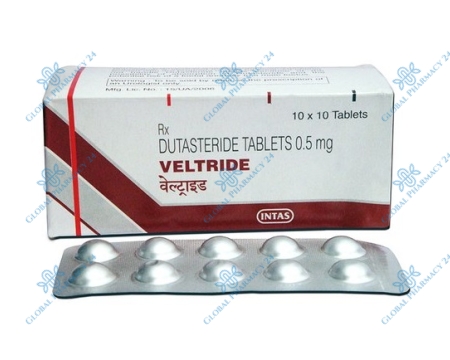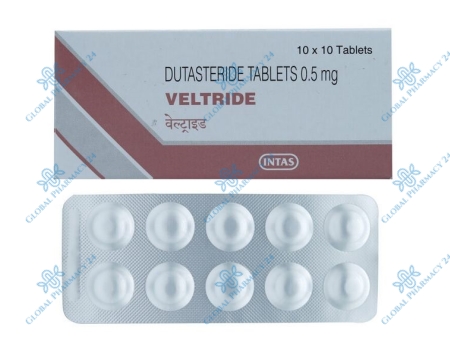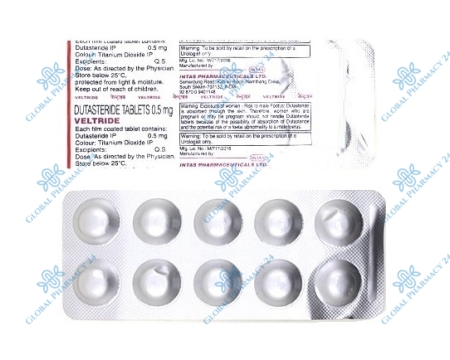| Characteristic | Details |
|---|---|
| Active Ingredient | Dutasteride |
| Indications | Treatment of Hair Loss (Androgenetic Alopecia) |
| Dosage Form | Oral Capsules |
| Strength | 0.5 mg |
| Duration of Treatment | Long-term (several months to years) |
| Side Effects | Libido changes, ejaculation disorders, impotence, etc. |
The Science Behind Veltride
Veltride, known for its active ingredient Dutasteride, targets the underlying causes of hair loss in men, particularly androgenetic alopecia. Unlike other treatments that superficially address hair loss symptoms, Veltride works by interfering with the hormonal pathway that leads to hair thinning and loss. This approach not only slows down hair loss but also promotes hair regrowth in some cases.
Understanding the role of dihydrotestosterone (DHT) in hair loss is crucial. DHT, a derivative of testosterone, is a key player in the development of androgenetic alopecia. High levels of DHT contribute to the miniaturization of hair follicles, eventually leading to hair loss. By inhibiting the conversion of testosterone to DHT, Veltride effectively reduces the concentration of DHT, thus tackling the root cause of hair loss.
The Role of DHT in Hair Loss
Dihydrotestosterone (DHT) is the primary hormone responsible for androgenetic alopecia. It binds to receptors in hair follicles, particularly in the scalp, shortening the hair growth cycle and causing the hair follicles to shrink. Over time, this leads to the thinning and eventual loss of hair. Understanding this mechanism is key to comprehending how Veltride acts to prevent hair loss.
How DHT Affects Hair Follicles
DHT's effect on hair follicles is both profound and complex. By attaching to specific receptors on the follicles, DHT shortens the anagen phase (growth phase) of the hair cycle, leading to shorter, thinner hair. Eventually, the hair follicles enter a dormant state, ceasing to produce hair altogether.
Why Lowering DHT Helps
Lowering DHT levels has been scientifically proven to halt the progression of hair loss and, in many cases, reverse it. Reducing DHT allows hair follicles to recover, prolonging their growth phase and resulting in thicker, healthier hair. Veltride's efficacy lies in its ability to significantly reduce DHT levels in the scalp.
How Veltride Interacts with DHT
Veltride inhibits the enzyme 5-alpha-reductase, which is responsible for the conversion of testosterone to DHT. By reducing the production of DHT, Veltride decreases the hormone's detrimental effects on hair follicles, thereby slowing down hair loss and encouraging the regrowth of new hair.
Veltride's Inhibitory Action
The inhibitory action of Veltride on 5-alpha-reductase is highly effective, leading to a substantial decrease in serum and scalp DHT levels. This action directly addresses the hormonal imbalance responsible for androgenetic alopecia, offering a targeted approach to treatment.
Research Supporting Veltride's Role
Clinical trials and research studies have consistently shown that Veltride is effective in reducing scalp and serum DHT levels, with many patients experiencing a cessation of hair loss and noticeable hair regrowth. Its role in managing androgenetic alopecia is well-supported by scientific evidence.
Making the Decision to Use Veltride
Deciding to use Veltride is a significant step in managing hair loss. Its proven efficacy in stopping hair loss and potential to stimulate hair regrowth make it a compelling option for many. However, it's important to weigh the benefits against the potential side effects and consult with a healthcare provider to ensure it's the right choice for your specific condition.
Understanding the risks and benefits of Veltride, including the possibility of side effects and drug interactions, is crucial. Patients should consider their long-term health goals, the severity of their hair loss, and their tolerance for potential side effects when making this decision. A thorough discussion with a healthcare provider can provide valuable insights and guidance.
Considering Veltride's Benefits
Veltride offers several benefits for individuals suffering from androgenetic alopecia, including slowing down hair loss, promoting hair regrowth, and improving the quality of hair. Its action against DHT makes it a powerful option for long-term management of hair loss.
Efficacy in Stopping Hair Loss
Veltride has been clinically proven to stop hair loss in a significant proportion of men, with many experiencing a halt in progression within a few months of starting treatment.
Potential for Hair Regrowth
In addition to stopping hair loss, Veltride has shown potential in promoting hair regrowth, with patients reporting improvement in hair density and thickness.
Long-term Use
When used over the long term, Veltride can maintain its efficacy in preventing hair loss, making it a viable option for sustained management of androgenetic alopecia.
Understanding the Risks of Veltride
While Veltride is effective, it comes with potential side effects, ranging from mild to severe. Being informed about these risks is essential for anyone considering this treatment.
Common Side Effects
Common side effects of Veltride include sexual dysfunction, such as decreased libido, erectile dysfunction, and ejaculation disorders. Most side effects are reversible upon discontinuation of the medication.
Serious Side Effects
Serious side effects, though rare, can include depression, breast tenderness, and enlargement. It is crucial to monitor for these effects and discuss any concerns with a healthcare provider immediately.
Potential for Drug Interactions
Veltride may interact with other medications, potentially altering their effects. Informing a healthcare provider about all medications being taken is important to avoid adverse interactions.
Pros and Cons of Veltride
- Pros:
- Effective in reducing DHT levels, addressing the root cause of hair loss
- Can stop the progression of hair loss and promote hair regrowth
- Long-term solution for managing androgenetic alopecia
- Cons:
- Potential for sexual side effects, which may be concerning for some patients
- Risk of serious side effects, though rare, requires monitoring
- Possible interactions with other medications
Living with Veltride: Real-world Experiences
Adopting Veltride as part of a hair loss management strategy has proven transformative for many, but it comes with the necessity to adapt to its regimen and potential side effects. Real-world experiences from Veltride users provide valuable insights into the drug's impact on daily life and long-term health. Sharing these experiences helps to set realistic expectations for those considering Veltride as a treatment option.
Physicians play a critical role in guiding patients through the decision-making process, offering expert perspectives on when Veltride is appropriate and how to effectively monitor treatment outcomes. This collaborative approach ensures that patients are well-informed and supported throughout their treatment journey.
Case Studies of Veltride Users
Case studies highlight the varied responses individuals may have to Veltride. Success stories are common, with many reporting significant halts in hair loss and noticeable regrowth. However, managing expectations and being prepared for potential side effects are key aspects of the treatment experience.
Success Stories
Many users report positive outcomes after incorporating Veltride into their treatment regimen, noting improvements in hair density and overall scalp health. These success stories serve as a testament to Veltride's potential benefits.
Dealing with Side Effects
While some users experience side effects, the majority find them manageable. Strategies for coping with side effects include close monitoring, open communication with healthcare providers, and, if necessary, adjusting the treatment plan.
Physician Perspectives on Veltride
Healthcare professionals emphasize the importance of a personalized approach when considering Veltride for hair loss. They advocate for comprehensive patient education on the benefits and risks, ensuring that the decision to use Veltride is well-informed.
When to Recommend Veltride
Physicians recommend Veltride based on specific criteria, including the severity of hair loss, patient health history, and the likelihood of benefiting from reduced DHT levels. The decision is always tailored to the individual's needs and circumstances.
Monitoring Patients on Veltride
Regular follow-ups are essential for monitoring the efficacy and side effects of Veltride. Physicians stress the importance of ongoing assessment to ensure optimal outcomes and adjust treatment as necessary.
FAQs Veltride
What is Veltride?
Veltride is a medication primarily used to treat benign prostatic hyperplasia (BPH), also known as enlarged prostate, in men. It contains the active ingredient dutasteride, which works by reducing the size of the prostate gland, thereby alleviating symptoms such as difficulty urinating.
How does Veltride work?
Veltride works by inhibiting the activity of the enzyme 5-alpha reductase, which is responsible for converting testosterone into dihydrotestosterone (DHT). DHT is known to contribute to the growth of the prostate gland. By reducing DHT levels, Veltride helps shrink the prostate gland, relieving symptoms associated with BPH.
Is Veltride safe to use?
Veltride is generally considered safe for use under medical supervision. However, like any medication, it may cause side effects in some individuals. Common side effects of Veltride may include decreased libido, erectile dysfunction, and decreased semen volume. It's important to discuss any concerns or potential risks with a healthcare professional before starting treatment with Veltride.
How long does it take for Veltride to work?
The effects of Veltride may not be immediately noticeable, and it may take several weeks or even months of consistent use before significant improvements in symptoms are observed. It's important to continue taking Veltride as prescribed by a healthcare professional, even if symptoms do not improve right away.
Can Veltride be used by women or children?
No, Veltride is intended for use by adult men only and should not be used by women or children. Women who are pregnant or may become pregnant should not handle crushed or broken Veltride tablets, as it may be absorbed through the skin and cause harm to a developing fetus. It's important to keep Veltride out of reach of children and to store it in a secure location.





















